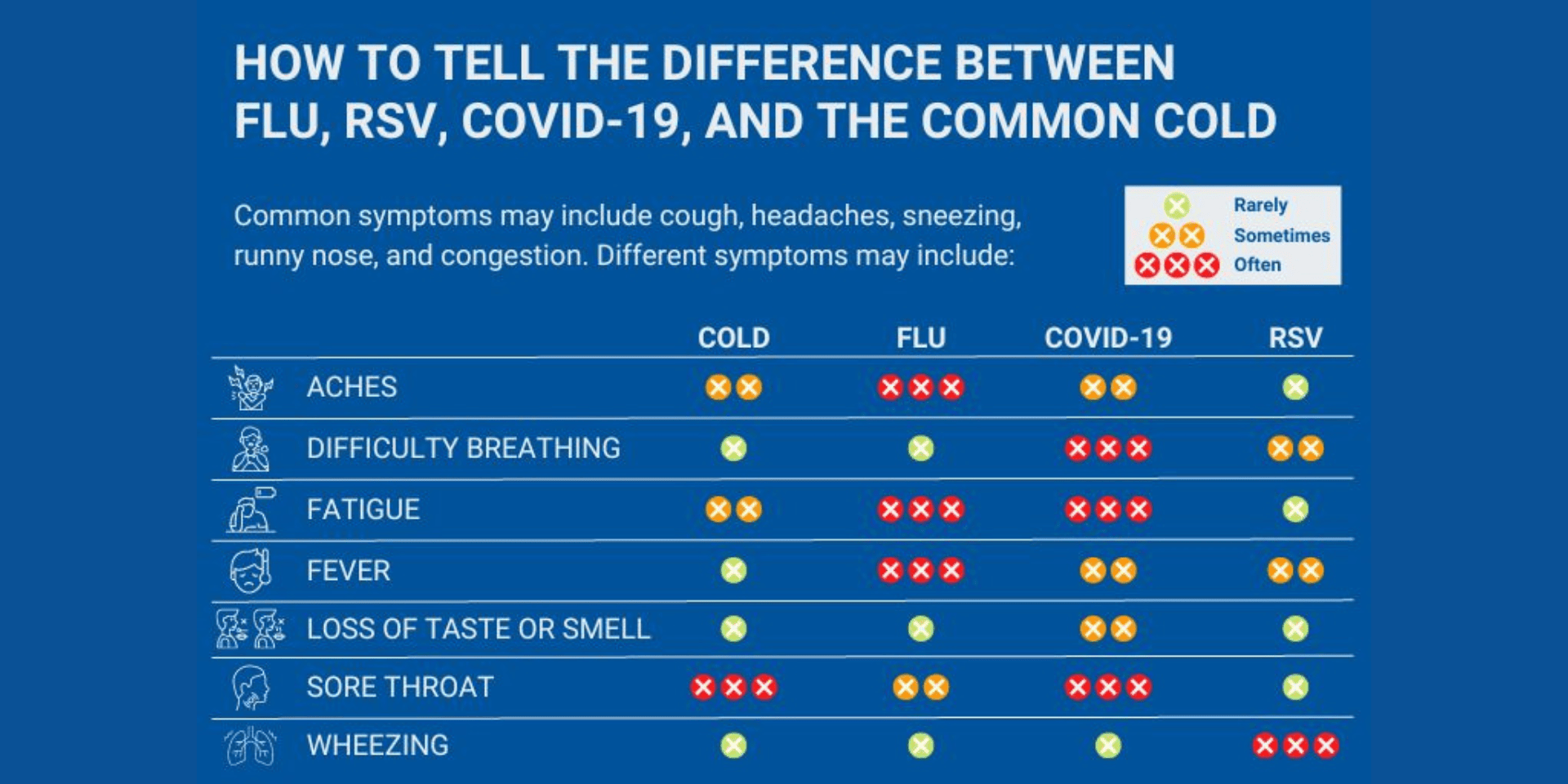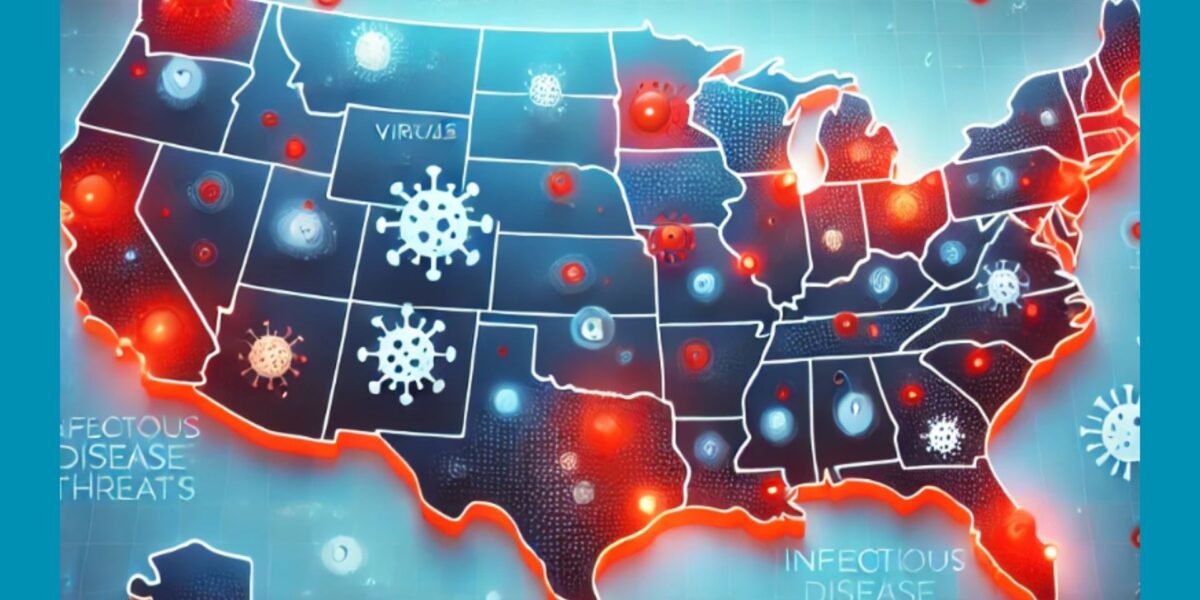
Is it a cold that is causing your cough or runny nose? Or could it be something potentially more serious—such as influenza (flu), COVID-19, or respiratory syncytial virus (RSV)?
It can be hard to tell the difference because the symptoms of these respiratory infections are often similar. Common symptoms of all 4 infections may include cough, headaches, sneezing, and congestion. To help you tell the difference, the National Foundation for Infectious Diseases (NFID) developed a simple chart, available in English and Spanish.
Why Testing Matters
If you have symptoms of flu or COVID-19, it is important to get tested as soon as possible. There are specific treatments available that may help you recover faster and avoid serious complications—especially if you are among those at higher risk including pregnant women, young children, older adults, or people with chronic health conditions including asthma, heart disease, or diabetes.
Treatment Options
Flu: If prescribed, taking flu antiviral drugs can make symptoms milder, shorten the duration of illness by 1-2 days, and help prevent serious complications, like pneumonia. Ideally, flu antiviral drugs should be taken within 2 days of the onset of symptoms. The Centers for Disease Control and Prevention (CDC) recommends prompt treatment for anyone at higher risk who has flu or suspected flu, so contact a trusted healthcare professional as soon symptoms first appear.
COVID-19: If you test positive for COVID-19, talk with a healthcare professional as soon as possible to see if treatment is right for you. COVID-19 antiviral drugs are most effective when taken within 5-7 days after symptoms begin. The Food and Drug Administration (FDA) has authorized or approved treatments for certain patients who are more likely to get very sick from COVID-19.
RSV: There are currently no specific antiviral medications or treatments available for RSV. Symptoms of mild cases of RSV can be managed with over-the-counter fever reducers and pain relievers (never give aspirin to children). More serious cases may require oxygen and respiratory care treatments, and in some cases, hospitalization.
Prevention
Of course, the best defense is a good offense. Use the NFID checklist to help ensure that you and your family stay up to date on recommended respiratory vaccines:
- Flu (Everyone age 6 months and older)
Everyone age 6 months and older should get a flu vaccine every year. If you are age 65 years or older or have a weakened immune system, talk with a healthcare professional about specific flu vaccines that offer extra protection.
- COVID-19 (Everyone age 6 months and older)
Everyone age 6 months and older should get an updated 2024-2025 COVID-19 vaccine to help protect against new variants that are circulating. CDC recommends a second dose (6 months later) for adults age 65 years and older and people who are moderately or severely immunocompromised.
- RSV (Older adults, pregnant women/infants)
RSV vaccination is recommended for all adults age 75 years and older, adults age 60-74 years who have certain risk factors, and pregnant women to help protect their infants. For infants born to mothers who did not get an RSV vaccine while pregnant, a monoclonal antibody is recommended.
- Pneumococcal disease (Young children, older adults, those with certain medical conditions)
Pneumococcal vaccines (sometimes called pneumonia vaccines) are recommended for all children younger than age 5 years, all adults age 50 years and older, and people with certain chronic health conditions, including heart disease, lung disease (asthma or COPD), kidney or liver disease, diabetes, sickle cell disease, or other conditions and treatments that weaken the immune system.
Vaccination can help prevent respiratory infections and reduce the likelihood of serious illness, hospitalization, and even death due to preventable diseases. If you do get sick, talk with a trusted healthcare professional about treatment options.
To join the conversation and get the latest news on infectious diseases, follow NFID on X (Twitter) using the hashtags #GetVaccinated, #FightFlu, and #StopTheSpread, like us on Facebook, follow us on Instagram, visit us on LinkedIn, listen and subscribe to the Infectious IDeas podcast, and sign up to receive NFID Updates via email.
Related Posts

News Round-Up: Infectious Disease Threats
According to NFID website poll, there are several worrisome infectious disease threats. Read recent news on topics of greatest concern, including avian influenza (bird flu), measles, and respiratory syncytial virus (RSV) …

Vaccines and Heart Health: A Vital Connection
Heart disease can increase the risk of serious or fatal complications from respiratory diseases including COVID-19, flu, and RSV

Harnessing the Power of Local Data
NFID dashboard aims to empower stakeholders with hyperlocal data to increase US adult respiratory vaccine uptake
